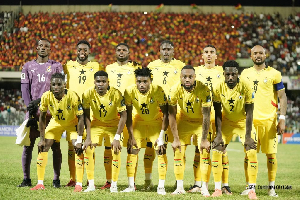Ghana currently sits atop Group I in the CAF 2026 FIFA World Cup qualifiers with 15 points after six matchdays. The group contains Mali, Madagascar, Central African Republic, Comoros and Chad. Qualification resumed in March 2025 and continues in September.
The Black Stars aim to return to the global stage after missing out in 2018. They now lead the pack after a 3-0 win over Madagascar that reinforced their campaign with authority.
Group dynamics and current standings
Ghana has built a comfortable advantage with five wins in six matches, scoring goals with precision and maintaining a tidy defence. Their only blemish came in a 1-0 loss to Comoros in November 2023.
Since then, they have tightened up, with wins over Madagascar and Chad making a statement. Comoros follows on 12 points and shows tenacity but remains less convincing in terms of goal difference.
Madagascar holds third place on ten points and impressed with a 4-1 win away in Bangui, though they lost heavily when visiting Ghana.
Mali, with nine points, has been inconsistent. Their 0-0 draw with Central African Republic stalled progress, and a 2-1 home loss to Ghana dealt a blow to early hopes.
Central African Republic and Chad, with five and zero points respectively, have found Group I less forgiving.
Ghana’s superiority appears reflected in every relevant column: points, goals scored, goals conceded, and the confidence with which they handle key fixtures.
Their depth has allowed them to rotate without suffering any loss of sharpness. Jordan Ayew’s five goals place him among the competition’s top scorers. The midfield, anchored by experienced professionals, has suffocated opponents, while the back line has remained disciplined.
Squad strength and tactical shape
The quality of players in the Ghana squad sets them apart. link textJordan Ayew (Leicester City) and Mohammed Kudus (West Ham United) headline a group with significant Premier League pedigree.
Thomas Partey (Arsenal) provides stability, while Antoine Semenyo (Bournemouth) and Abdul Fatawu (Leicester City) bring width and speed. These players are battle-tested and accustomed to high-pressure fixtures.
Comoros, by contrast, draws largely from French lower divisions and a handful of regulars in Ligue 1 and 2. While they have produced strong home form, their away record has been uneven.
Madagascar has been adventurous, deploying attacking setups in favourable matches, but they conceded three goals without reply in Kumasi.
Mali fields a competitive team with Premier League figures such as Yves Bissouma (Tottenham) and Cheick Doucouré (Crystal Palace). Still, their forward play has lacked bite outside the performance of Kamory Doumbia, who has scored five.
Central African Republic and Chad have struggled to keep shape under pressure. Their defensive records, especially Chad’s -14 goal difference, indicate that the group’s upper half is operating on a different level of preparation and execution.
Global attention and continental pride
Fans and supporters from abroad continue to show strong backing for Ghana’s qualification run. That support appears in subtle but measurable ways. One example is how Ghana features in sports betting in Australia, where odds of 151.0 place them alongside Egypt and Senegal.
This presence signals global recognition and interest beyond the continent. International fans see Ghana as a realistic contender, and bookmakers respond to that attention.
No other CAF Group I team appears on these global betting charts. The absence of Mali, Madagascar, Comoros, Central African Republic and Chad implies their perceived chances are too low to attract market demand. Ghana’s inclusion reflects its established football identity and continued international attention in competitive global contexts.
Where focus belongs
Ghana’s dominance within Group I is reflected in numbers, performances and attention. The squad includes footballers accustomed to Europe’s highest levels. Their organisation is consistent, and they execute plans with clarity. Fixtures attract interest from beyond the continent, and the team’s visibility reflects the relevance of their campaign.
Their rivals show glimpses of cohesion but have not sustained that across the qualifying period. Ghana keeps progressing, with matches ahead that offer opportunity to secure top place before the final matchday arrives.



